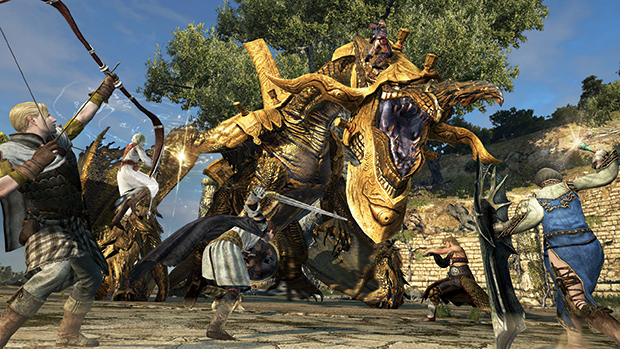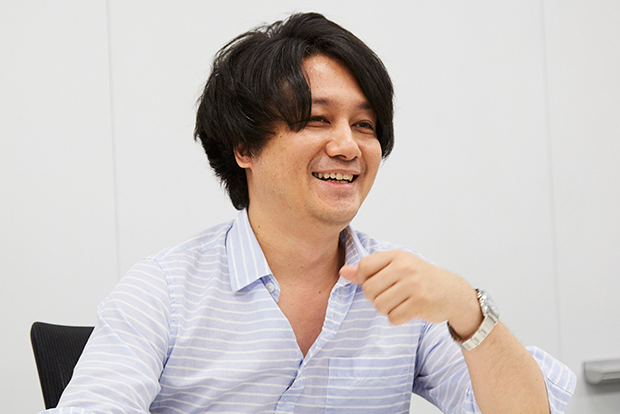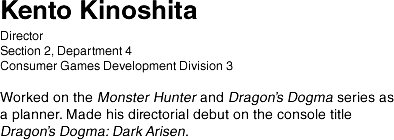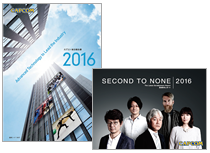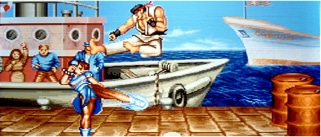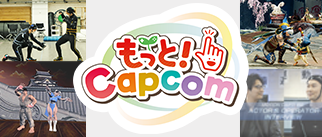- First, tell me about your career. What projects have you worked on in the past?
- I joined Capcom in 2001 and worked as a planner on a racing game titled auto modellista, as well as on the Monster Hunter series. While I was helping with Monster Hunter Portable 3rd, the director of Dragon’s Dogma—Mr. Itsuno—invited me to join the project. This was where I started working on this series, eventually leading to my current position. I first worked as a director on Dragon’s Dogma: Dark Arisen, an expansion of Dragon’s Dogma.
- I hear that Dragon’s Dogma Online and Dragon’s Dogma: Dark Arisen were being developed simultaneously.
- While there had been requests for multi-player functionality from our customers, we gave priority to creating Dark Arisen as version 1.5 of Dragon’s Dogma because we had just released that game worldwide. At the same time, however, a proposal to develop an online version had been making the rounds internally, which lead us to prepare for an online follow-up while we were working on Dark Arisen.
- So, the company’s thinking lined up with that of your fans.
- Yes. Dragon’s Dogma featured AI-controlled companions called “pawns,” who added a high degree of freedom to the action. Because of this, we received a lot of requests from fans to add multiplayer. However, we didn’t want to just add multiplayer functionality; we wanted to create an online game, with a system players could enjoy over the long run. To do this, we redesigned the game from the ground up, building in features such as a bazaar, group events and community elements.
- Specifically, what did you change?
-
We maintained the game’s strengths, starting with the world and atmosphere and including the action and pawn system. Though rather than having players proceed to the ending of the game’s story, we needed a game system with content they could enjoy on a continuous basis.
Modifying the design of Dragon’s Dogma to work as an online game was a real challenge.
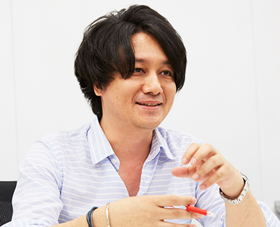
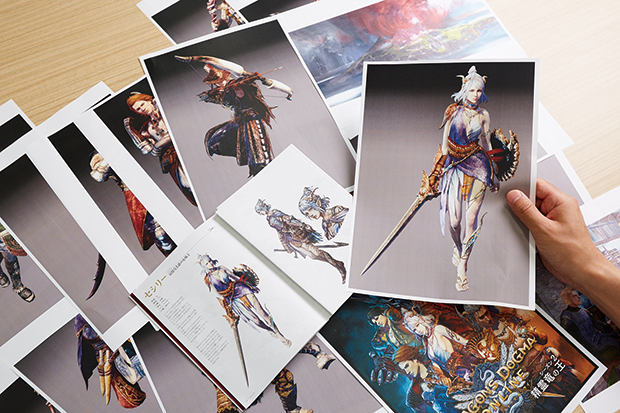
- Dragon’s Dogma Online was Capcom’s first MMO (massively multiplayer online) game.
- Monster Hunter Frontier—another online game from Capcom—is our sort of pioneering example of a server-managed game originating from a console title. I was able to get a lot of advice from members of that project, such as on the importance of data management and the challenges involved with expansions. Using this knowledge, we took on the challenge of making Dragon’s Dogma Online Capcom’s first project to use servers to manage all of the character data and game progress.
- Considering it was the first-ever online Dragon’s Dogma title, why do all of this?
- I wanted to offer an ongoing service that leveraged Dragon Dogma’s strength with action in a Multiplayer Online (MO) environment while incorporating the fun of an MMO into everything else. My goal was to expand the world of Dragon’s Dogma, creating a game that combines the strong point of adventuring with your pawn and the excitement of large groups of players all playing simultaneously together.
- Having adopted the MMO format, did things such as players playing the game in unexpected ways present any difficulties for you in building out the game progression or the story?
- Certainly, there were some hurdles for us to overcome. But we decided we really just had to focus on maintaining the quality of the action and compelling aspects of the game’s content for the players. If we succeeded in that, the details of how the game data was managed wouldn’t impact the user experience. By putting together the best aspects of MOs and MMOs, and building and operating the servers ourselves, we could add updates or handle any customer service issues flexibly, which would be a plus for the players.
- But the servers must have been tough to build.
- Yes, really tough (smiles). Our server team went above and beyond, words really don’t do them justice. When we started development, there were a limited number of server engineers in the company with expertise in MMO games. So, when I put out the call, a number of people who didn’t necessarily have a lot of experience building servers volunteered—up for the challenge specifically because they loved Dragon’s Dogma. This actually proved to be very fruitful.
- So you gathered a talented and highly motivated team. What did you tackle first?
- First, we invited some server building experts from CEK—Capcom’s studio in South Korea. For knowledge sharing purposes we had them give us some intensive training sessions. Even after we’d established the servers, the system often became unstable and generated communication delays due to localized performance issues. In addition, issues continued to crop up because we developed the game in parallel with server stabilization: implementing certain elements here would cause the server to become unstable, or adding new elements there would cause communication speed to drop, and so on. Furthermore, we had to estimate the server costs and determine how we would handle contingencies such as a server going down.
- All the turns and twists one might expect on a challenging project.
- In addition to the operation of the game on the servers, we had to deal with stabilization and redundancy as the launch date loomed. However, the server team was having schedule issues and, at the same time, we’d received some feedback regarding game design. We had no option but to prioritize. Since it was our first attempt, we had to go at it from a “crash-and-build” approach. Our server team and programmers grumbled a bit—but really came through for us here.
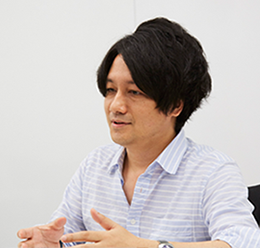
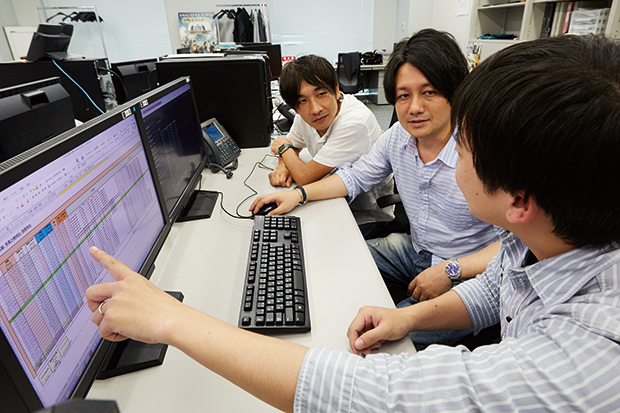
- Tell me about what exciting things are in store for Season 2, the major update.
- There are five dragons in the world of Dragon’s Dogma Online, and each plays an important role. Season 1 brought the White Dragon—the first of the five—as well as a large number of Arisen (the players) into the world. The story concluded with players and their allies triumphing over the evil alchemists and the Gold Dragon. Season 2 has a new continent and new dragon, though both the story and the setting are continuations from those of Season 1. To keep players engrossed in their adventure in the world of Dragon’s Dogma Online, we put a lot of energy into developing the new settings and stories. We’ve been able to expand upon the scenario in a way that is unique to the online game format, thanks to the insights that we gained during Season 1.
- What about new features in the system?
- We have two. The first is a new job class that uses a spear, called “spirit lancer. ” We’ve really worked on ensuring the sense of freedom in the controls, so even though this is an online game players can expect the action to not miss a beat. The second is expanded content to help deepen players’ enjoyment of the world and role-playing aspects of the game. We added houses for players where they can live together with their pawn for people who find the action aspects of the game a bit of a challenge and want to enjoy things at their own pace. In the future, we plan to establish clan bases where players can get together and share in the effort of expanding their base.
- What aspects of the scenario are unique to online games?
- Because episodes are separated by each version update, there is inevitably an interval between one episode and the next. We’ve worked to sustain users’ interest until the next update, such as by providing some narration at the end of each episode. From a scenario and content perspective, we’ve come to understand how to develop episodes that can entice users to keep coming back.
- How did you determine the points and approaches for monetizing the game?
- Approaching it from the framework of the game’s design was, as you might expect, big. We consciously designed it on the premise that players can enjoy the game without paying, only with certain points where you can pay to unlock additional content to delve even deeper into the game. Our design policy has been, first, for players to be able to play for free; on top of that, we provide points where each person can judge whether to pay after considering both their level of interest and how much time they would like to invest in the game.
- How has the PC online games market been in general?
- Looking only at Japan, we sense that the number of players who play online RPGs on PC has grown smaller. On the one hand, the number of big titles exclusive to PC seems to be decreasing, while on the other home consoles such as the PlayStation 4 and Xbox One have built up a library of titles with engrossing online features. In other markets—for example South Korea, where PC gaming is more deeply rooted—the enthusiasm is still there. But in Japan, the shape of PC online games may be changing somewhat.
- What genres of games are popular in markets outside of Japan now?
- MMO FPSs (first-person shooters) and fantasy-themed MMOs are popular.
- So, as a fantasy MMO, Dragon’s Dogma Online is situated in a popular category. Looking ahead, do you see the game being brought to overseas markets—especially the Asian market?
- There are many countries where the PC game market has yet room to grow. Once we’ve established a solid foundation for the game here in Japan, I’d like to consider expanding overseas.
- To this end, you’re planning to release updates of the game from Season 1 through Season 3 in Japan, right?
- The story is one aspect of an online game’s content. I want to continue service for at least five years with playable content, not just following the thread of the story, but by expanding upon the story and world as each version progresses.
- Finally, tell me your aspirations for the future.
- Feedback from the players is very encouraging for us. I’d like us to continue moving forward every day, gaining insights from user feedback and analyzing what might delight them based on their requests. We want to work hard and grow Dragon’s Dogma Online so that we satisfy both those users who enjoy the action as well as those who take their time to work their way through the stories.
